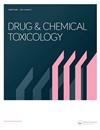Effects of a 28-day oral exposure to a 5-chloro-2-methyl-4-isothiazolin-3-one and 2-methyl-4-isothiazolin-3-one biocide formulation in Sprague-Dawley rats.
Abstract
Biocides are added to biodiesels to prevent degradation resulting from microbial growth. A 28-day repeated oral dose study was conducted to assess a potential risk arising from ingestion of isothiazolinone biocides in biodiesels. A mixture of 5-chloro-2-methyl-4-isothiazolin-3-one and 2-methyl-4-isothiazolin-3-one (CMIT/MIT) diluted in corn oil was administered by gavage to male and female rats at 0, 0.26, 0.78, 2.33 and 7.0?mg/kg body weight per day. Rat water and food consumption was monitored. At the end of the dosing period, organs were weighed and histological examinations performed. Hematology, serum clinical chemistry and biomarkers of inflammation were assessed. Reduction of serum triglyceride levels in males and induction of hepatic phase 1 xenobiotic metabolizing enzymes in females accompanied by subtle histological changes in the liver were observed at the highest CMIT/MIT exposure. These changes were more indicative of an adaptive, reversible response than overt toxicity. Based on recommended levels for the control of microbial growth in fuels, CMIT/MIT contained in accidentally ingested biodiesels is not expected to represent a significant health risk.





